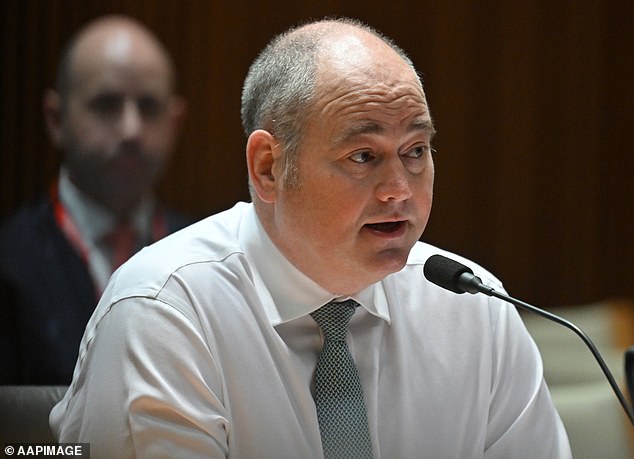Fees charged by retailers on credit card payments made by customers should be banned, according to the heads of the country’s big four banks.
Businesses are currently given the green light to add a surcharge to their prices to cover what banks charge to process electronic payments – data from the Reserve Bank shows this collectively costs Australians $960 million a year.
NAB chief Andrew Irvine recently told a parliamentary inquiry into banks that the practice was “outdated” and that suppliers should absorb the expense as “part of the cost of doing business”.
The RBA is currently reviewing the surcharges and plans to publish a consultation paper by the end of 2024, but Irvine said the fact that businesses such as cafes were charging people additional fees of up to 10 per cent on items was “outrageous”.
Under rules set by the RBA and enforced by the Australian Competition and Consumer Commission (ACCC), surcharges can only reflect what it costs a business to process a specific type of payment.
As a guide, the RBA estimates this to be approximately 0.5 per cent for Eftpos, between 0.5 and 1 per cent for Visa and Mastercard debit cards, and between 1 and 1.5 per cent for Visa and Mastercard credit cards.
NAB, ANZ, Westpac and CBA reported combined 2023 profit after tax of $32.5 billion, up 12.4% from 2022 on the back of higher interest rates.
By contrast, small and medium-sized businesses are struggling with insolvency rates at their highest in decades, according to financial watchdog ASIC, as operating costs and loan repayments rise and customers tighten spending amid rising cost-of-living pressures.
NAB chief Andrew Irvine said firms should absorb tap-and-go processing fees as part of their costs rather than passing them on to customers.

The ACCC controls card surcharges, but businesses can add other surcharges, such as for holidays or weekends.
Mr Irvine said there should be more transparency if the surcharges were to remain.
“The surcharge may have been justified more than 20 years ago, but I think it’s up to us to ask whether it still serves its purpose,” he told the committee on Friday.
“This only adds to the confusion. It means I don’t know what the price of a product I’m buying is and I don’t like it.”
Westpac boss Peter King told the inquiry he was also concerned about the surcharges.
“We have a market that is too complex for the consumer to make a decision, and the other problem we have is that some merchants are charging fees above their cost because there is no enforcement of the rules,” he said.
ANZ’s Shayne Elliot said clarity around surcharges would benefit Australians.
“People are finding it increasingly difficult to pay for housing and everyday expenses, and businesses are facing higher costs,” he said.
This comes after Commonwealth Bank chief executive Matt Comyn told the committee the difference between cash payments and surcharge-charged card purchases was not a fair comparison.
Companies also incur costs with physical cash, such as insuring and transporting it, but these charges are absorbed as operating costs.

The Big Four banks are all members of the Business Council of Australia (pictured: outgoing chair Jennifer Westacott (second from left) with Prime Minister Anthony Albanese (far left) and Commonwealth Bank CEO Matt Comyn (second from right)
Earlier, the NAB boss said Australia was experiencing a “two-speed economy”.
Irvine said cost-of-living pressures continued to weigh on people and economic growth remained weaker than in previous years, but he expected interest rates to start coming down.
“Today there are two Australias and a two-speed economy. Clients in certain sectors and certain geographies are doing well and have growth ambitions,” he said.
‘People are having to make tough decisions about where to spend their money.
“They are getting ahead, but it is difficult.”
The banking executive said people in the mining and resources sectors, along with those living in jurisdictions such as Western Australia, Queensland and the Northern Territory, were doing well in economic conditions.
But many in southeastern states and those in retail and construction were under more pressure.
Mr. Irvine urged the federal government to keep inflation under control as many mortgage holders struggle with the level of interest rates.
“We all need to remember that one in three Australians has a home loan,” he said.
‘On the other hand, inflation affects everyone and tenants have been particularly affected by rising rents and living costs.’
Australians with mortgages continue to feel the pain in their pockets as the official cash rate has remained at 4.35 per cent since November.
Mr Irvine said Australia’s growth rate had been around 1.5 per cent, which was lower than in the past three decades.
“Most consumers are coping, juggling, finding balance, but not having fun,” Irvine said.

Hidden markups added to retail prices cost Australians around $960 million a year, RBA says
“Younger families who have purchased a home in the last five years are probably the ones who are having the hardest time.”
The NAB chief said he was still optimistic about lowering interest rates from early 2025.
“We are getting to a point where interest rates will start to come down. That will create more money in the economy, more demand in the economy, which will mean that businesses will be healthier,” he said.
“When interest rates start to come down sometime next year, which we hope they will, I think that will have positive impacts for everyone.”
Card surcharges are already banned in Europe, Canada, the United States and the United Kingdom.


